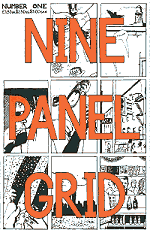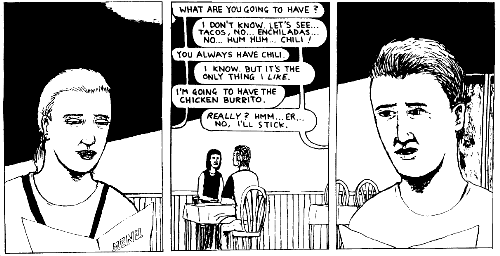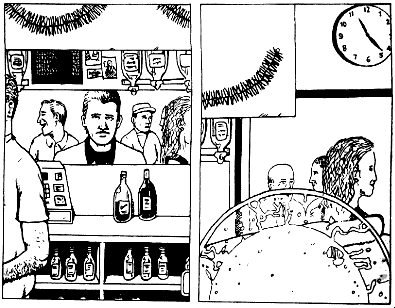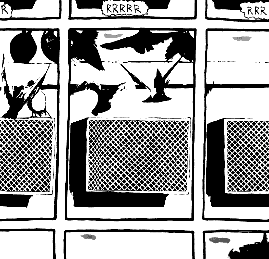Nine Panel Grid
 If it was good enough for Watchmen, it should be good enough for anyone, right?
If it was good enough for Watchmen, it should be good enough for anyone, right?
In Nine Panel Grid, creator James Pyman adheres pretty strictly to a standard grid of 3 rows, with 3 panels each. Hence the name. He bends the rules a little from time to time, by spreading a single scene over two, three, or even eighteen panels, but the gutters are all there, on every page, every issue. Even the letters page.
The centerpiece of the series is a story called “Greetings from Asbury Park N.J.”, about a young Englishman living in New York, taking a road trip with his American girlfriend to the “funky rundown beachtown”. About half of each issue is dedicated to a serial installment. It’s a fairly “pointless” narrative, simply following them as they set out, travel down the highway, and explore the beach and city. It comes across as a real-life story, with just enough mini-drama and humour to entertain, without seeming fabricated.

 The rest of each issue is taken by a self-contained story or short piece. “The Star on Christmas Eve” in Nine Panel Grid #1, for example, is a (nearly) wordless recounting of an evening spent at the local pub. It’s told entirely from the perspective of unnamed central character; that is, every panel (all nine per page) is drawn as seen through his eyes. It too mixes documentation of the mundane (e.g. taking a drink of ale, two visits to the gents’) with micro-drama (e.g. a threatening stranger stops him on the street). The short story in #2 is an adaptation of a story by Charles Bukowski, about a middle-aged woman who answers a personal ad posted in a car window. Issue #3’s is a peculiar story about (half)-lost innocence of adolescence. In general, they’re thoughtful and intriguing, and often a bit amusing.
The rest of each issue is taken by a self-contained story or short piece. “The Star on Christmas Eve” in Nine Panel Grid #1, for example, is a (nearly) wordless recounting of an evening spent at the local pub. It’s told entirely from the perspective of unnamed central character; that is, every panel (all nine per page) is drawn as seen through his eyes. It too mixes documentation of the mundane (e.g. taking a drink of ale, two visits to the gents’) with micro-drama (e.g. a threatening stranger stops him on the street). The short story in #2 is an adaptation of a story by Charles Bukowski, about a middle-aged woman who answers a personal ad posted in a car window. Issue #3’s is a peculiar story about (half)-lost innocence of adolescence. In general, they’re thoughtful and intriguing, and often a bit amusing.
 The back pages are imaginative little not-quite-still life scenes: each panel focusing on the same single scene, with subtle changes from one to the next. Cool.
The back pages are imaginative little not-quite-still life scenes: each panel focusing on the same single scene, with subtle changes from one to the next. Cool.
Pyman’s art is a bit rough and sketchy. It’s become a bit more polished since #1, but still suffers a bit from not quite “getting” how to put together a human face or body. (My art suffers from the same problem, so I notice it quickly. {smile}) He included a couple pages of “sketchbook” material in the last couple issues, which are (incredibly) even sketchier, to the point that you can’t tell what many of the panels are of. They are, in fact, just preliminary sketches from plotting out the stories, not the camera-ready pin-ups that many artists would like us to believe populate their sketchbooks.
